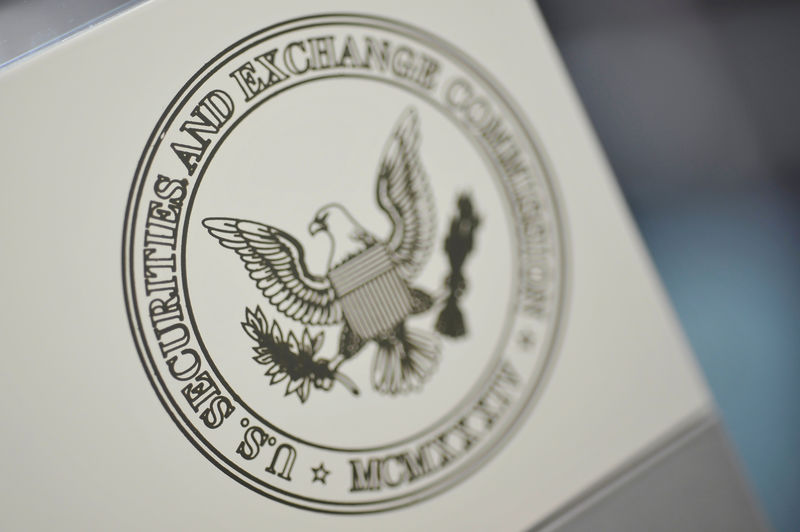WASHINGTON (Reuters) - Under the Trump administration, the Securities and Exchange Commission (SEC) has taken more than two dozen measures - including trimming rules - that make life easier for corporate America, according to a Reuters analysis of SEC announcements and interviews with more than a dozen lawyers, academics and advocacy groups.
Here are highlights of some of the changes that the SEC hopes will encourage more companies to go public.
CONFIDENTIAL IPOS
In July 2017, the SEC allowed companies of all sizes to confidentially file with the agency for initial public offerings. The move effectively extended a provision created by the 2012 Jumpstart Our Business Startups, or JOBS Act, that allowed companies of $1 billion in revenues or less to file in private.
The change allows firms more flexibility to work out kinks with the SEC before subjecting their finances to public scrutiny.
Several tech "unicorns" including Uber (N:UBER), Lyft (O:LYFT) and Slack Technologies (N:WORK) used the new provision before listing this year. Critics say confidential filings give investors less time to review key financial data before having to commit to purchasing shares.
WHISTLEBLOWER REWARDS
In June 2018, the agency proposed revamping a program that rewards corporate whistleblowers, whose original information leads to an enforcement penalty, up to 30% of the settlement.
The program, which was created by Congress in the wake of the 2008-2009 financial crisis, is widely regarded as a major success, leading the SEC to levy more than $1.4 billion in fines on malfeasant companies.
The SEC has proposed a discretionary cap of $30 million when it recovers over $100 million, and a discretionary floor of $2 million when it recovers a smaller amount, as well as other changes which may help to deter bogus or unhelpful tips that have stretched staff, say lawyers.
The proposal, which is still under discussion, has sparked outcry from whistleblower advocates, who say it would weaken protections for tipsters and discourage insiders from coming forward.
QUARTERLY REPORTING
Quarterly public reporting by listed companies has long been a controversial subject, with many corporate governance experts arguing it leads companies to be too short term in their outlook.
In December 2018, the SEC opened a public consultation on ways to ease the reporting burden, including by potentially moving to a semiannual cycle.
Some investors and analysts have said less frequent reporting could encourage companies to think more long-term, but others say quarterly reports provide critical information.
SEC Chairman Jay Clayton has thrown cold water on the notion that large companies would get out of quarterly reporting any time soon, but has said small company reporting merits studying. It is not clear if the SEC will proceed with a formal rule-change.
SARBANES-OXLEY ROLLBACK
In May 2019, the SEC proposed exempting public companies with less than $100 million in revenues from a requirement to get an external auditor to sign off on the adequacy of their internal financial reporting controls. The proposal would ease a rule introduced by the 2002 Sarbanes-Oxley Act in the wake of the Enron and WorldCom accounting scandals. The SEC said such an exemption should help reduce small companies' compliance costs.
But opponents of the proposal, including Rob Jackson, a Democratic SEC commissioner, and Harvard University academics, say it could lead to more corporate fraud. The SEC says there is no data to substantiate this claim and notes that companies overall will continue to be audited.
TESTING THE WATERS
In September, the agency finalized a new rule that allows all companies to privately sound out prospective institutional and certain accredited investors before filing for a stock exchange listing, expanding another provision of the 2012 JOBS Act.
The "testing-the-waters" rule, which previously applied only to smaller firms, helps companies gauge broader market interest before committing to time-consuming and expensive paperwork and SEC review.
But critics have said it gives large institutional fund houses, which get the opportunity to quiz the people running the startups, an edge over retail investors who don't get such access. They also say the rule does not impose a strict enough bar when determining if someone is an accredited investor.
DISCLOSURE MODERNIZATION
The SEC's disclosure regime has not been updated in three decades and most experts agree it is in need of a refresh. Clayton's SEC has taken several modernization measures, with a focus on reducing redundancy and making material disclosures more easily identifiable for investors.
Last year, for example, the SEC updated disclosure rules for hedging transactions and to ensure investors get a comprehensive picture of mining companies' assets. In August, the SEC proposed giving companies more flexibility in how they disclose general business development issues, litigation and risk factors.
It would also require firms to tell investors what material changes have been made to the demographics, stability and culture of their workforce.
Many industry participants, as well as Jackson and fellow Democratic commissioner Allison Lee, have supported some components of the modernization effort.
However, the SEC's decision in March to no longer require companies to seek its permission to redact confidential information from disclosures has sparked concerns that investors will miss key information. The SEC points out that staff will continue to scrutinize the redactions.
PROXY ADVISER CRACKDOWN
The SEC has launched a controversial campaign to rein in proxy advisers that make recommendations on how investors should vote in corporate elections. Lobbyists say these firms have accumulated too much power and often make damaging errors.
In August, the SEC implemented two pieces of guidance clarifying the obligations of proxy advisers and investors that rely upon them. The guidance lays out the considerations for investors when they retain a proxy adviser, including assessing the firm's conflicts of interests and potential mistakes in reports.
Proxy adviser Institutional Shareholder Services Inc is suing the SEC over the guidance. The SEC this week proposed changes that would limit the ability of shareholders to submit proposals on items like executive compensation to company management.
